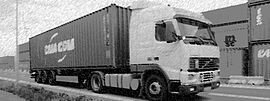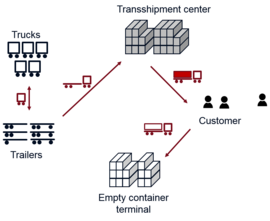Cooperative Container Trucking
The project aims to improve the container trucking performance through computer optimization methods, real-time data collection and organizational innovation. The latter will be achieved by the development of an online collaboration platform between carriers.
The container trucking is the last mile of the sea container transport chain, from the container terminal to the receiving client, or the first mile from the sender client to the terminal. Besides the driver and the truck, two additional resources have to be managed in order to build an efficient truck route: the container and the flatcar (chassis). In order to reduce the costs of the carrier, the optimization objective has to include travel and waiting times, flatcar changes, fuel consumption, motorway tolling costs, to mention the most important factors. In the same time the created plan has to satisfy pickup and delivery due dates at the client location, opening times and regulatory driving and resting durations. Another task is to dynamically adapt the schedules as new trucking orders become known or unexpected delays occur. This functionality requires a dynamic optimization approach and the availability of near real-time information from the trucks in the field such as location, current state, estimated loading and travel times.
Therefore data collection plays a significant role in the strategic planning: it goes beyond GPS tracking, as it allows the driver to inform the system with a simple click on his smartphone about the arrival at a customer premises or the uncoupling of the flatcar. These events are processed and help to maintain the current state of the system. In addition, travel times and loading/unloading times are continuously calculated and statistically evaluated, improving the data basis for future planning cycles.
The collaboration platform is a challenging task. Nowadays, spontaneous collaboration between carriers exists, meaning that a carrier provides a truck and driver at a certain price for executing one or several transportation tasks. However, a collaboration platform can convince a carrier partner only if he can preview and understand the cost advantage induced by that collaboration. Our claim is that the optimized routes of an augmented fleet that includes trucks and orders from different carriers are more cost efficient than when each carrier plans its own routes.
The project was funded by the FFG in the call “Mobilität der Zukunft”, from April 2015 to March 2017.
Partner
-
AIT Austrian Institute of Technology
-
Interlogistik GmbH
-
Liedauer & Kral GmbH
- Multitask GmbH






